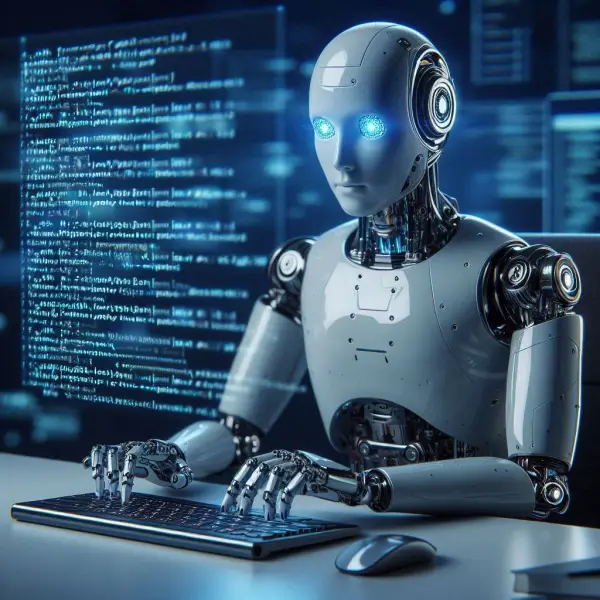Can AI collapse? Experts warn about its dangers and solutions
Why can generative AI self-destruct? Discover recent studies that alert about its degradation and the experts who analyze possible solutions....
Table of Contents
- The Alarm of Degradation in Generative AI
- The Collapse of the Model: A Degenerative Phenomenon
- The Difficulty of Human Intervention
- An Uncertain Future: Challenges and Possible Solutions
Follow Patricia Alegsa on Pinterest!
The Alarm of Degradation in Generative AI
Recent studies have raised alarms about a disturbing phenomenon in the development of generative artificial intelligence: the degradation of the quality of responses.
Experts have pointed out that when these systems are trained with synthetic data, that is, content generated by other AIs, they can fall into a cycle of deterioration that culminates in absurd and nonsensical responses.
The question that arises is: how does one reach this point and what measures can be taken to prevent it?
The "model collapse" refers to a process in which AI systems become trapped in a training cycle with poor quality data, resulting in a loss of diversity and effectiveness.
The Collapse of the Model: A Degenerative Phenomenon
The "model collapse" refers to a process in which AI systems become trapped in a training cycle with poor quality data, resulting in a loss of diversity and effectiveness.
According to Ilia Shumailov, co-author of a study published in Nature, this phenomenon occurs when AI begins to feed on its own outputs, perpetuating biases and diminishing its usefulness. In the long run, this can lead to the model producing increasingly homogeneous and less accurate content, like an echo of its own responses.
Emily Wenger, a professor of engineering at Duke University, illustrates this problem with a simple example: if an AI is trained to generate images of dogs, it will tend to replicate the most common breeds, leaving aside those that are less known.
Emily Wenger, a professor of engineering at Duke University, illustrates this problem with a simple example: if an AI is trained to generate images of dogs, it will tend to replicate the most common breeds, leaving aside those that are less known.
This is not only a reflection of data quality, but it also poses significant risks for the representation of minorities in training datasets.
Also read: Artificial intelligence becoming smarter and humans becoming dumber.
Despite the seriousness of the situation, the solution is not straightforward. Shumailov indicates that it is unclear how to prevent the collapse of the model, although there is evidence that mixing real data with synthetic data can mitigate the effect.
Also read: Artificial intelligence becoming smarter and humans becoming dumber.
The Difficulty of Human Intervention
Despite the seriousness of the situation, the solution is not straightforward. Shumailov indicates that it is unclear how to prevent the collapse of the model, although there is evidence that mixing real data with synthetic data can mitigate the effect.
However, this also implies an increase in training costs and greater difficulty in accessing complete datasets.
The lack of a clear approach for human intervention leaves developers with a dilemma: can humans really control the future of generative AI?
Fredi Vivas, CEO of RockingData, warns that excessive training with synthetic data can create an "echo chamber effect," where AI learns from its own inaccuracies, further reducing its ability to generate accurate and diverse content. Thus, the question of how to ensure the quality and utility of AI models becomes increasingly urgent.
An Uncertain Future: Challenges and Possible Solutions
Experts agree that the use of synthetic data is not inherently negative, but its management requires a responsible approach. Proposals such as implementing watermarks on generated data could help identify and filter synthetic content, thus ensuring quality in the training of AI models.
However, the effectiveness of these measures depends on cooperation between large tech companies and smaller model developers.
The future of generative AI is at stake, and the scientific community is in a race against time to find solutions before the bubble of synthetic content bursts.
The future of generative AI is at stake, and the scientific community is in a race against time to find solutions before the bubble of synthetic content bursts.
The key will be to establish robust mechanisms that ensure AI models remain useful and accurate, thus avoiding the collapse that many fear.
Subscribe to the free weekly horoscope
Aquarius Aries Cancer Capricorn Gemini Leo Libra Pisces Sagittarius Scorpio Taurus Virgo
-
 Telegram vs WhatsApp: Which is the best option for your business?
Telegram vs WhatsApp: Which is the best option for your business?
Discover the differences between Telegram and WhatsApp: WhatsApp easily connects with Facebook and Instagram in its business version. Get informed now! -
 A story of a breakup: overcoming emotional grief
A story of a breakup: overcoming emotional grief
Discover the profound journey of emotional grief: a complex process that reveals its pain over time. A reflection that invites healing. -
 Revolutionary advance: Early diagnosis of memory loss in older people
Revolutionary advance: Early diagnosis of memory loss in older people
Researchers from Mayo Clinic have discovered a breakthrough regarding memory loss in older adults, affecting the limbic system. Exclusive details in Infobae. -
 1,700-year-old Roman sarcophagus discovered at beach bar in Bulgaria
1,700-year-old Roman sarcophagus discovered at beach bar in Bulgaria
A 1,700-year-old Roman sarcophagus discovered at a beach bar in Varna, Bulgaria. Authorities are investigating its mysterious arrival at Radjana Beach. -
 Extreme Phenomena: Fire Tornadoes and Climate Change
Extreme Phenomena: Fire Tornadoes and Climate Change
Extreme phenomena, increasingly frequent, intensify fires and affect climatology at both local and global levels. Learn about their impact!
I am Patricia Alegsa
I have been writing horoscope and self-help articles professionally for over 20 years.
Subscribe to the free weekly horoscope
Receive weekly in your email the horoscope and our new articles on love, family, work, dreams and more news. We do NOT send spam.
Astral and numerological analysis
-
 Discover your future, secret personality traits and how to improve in love, business and life in general
Discover your future, secret personality traits and how to improve in love, business and life in general
-
 Online Dream Interpreter: with artificial intelligence
Do you want to know what a dream you had means? Discover the power of understanding your dreams with our advanced online dream interpreter using artificial intelligence that responds to you in seconds.
Online Dream Interpreter: with artificial intelligence
Do you want to know what a dream you had means? Discover the power of understanding your dreams with our advanced online dream interpreter using artificial intelligence that responds to you in seconds.
-
 Take Care of Your Brain: A Guide to Preventing Alzheimer’s with Diet and Habits
Take Care of Your Brain: A Guide to Preventing Alzheimer’s with Diet and Habits
Discover how to take care of your brain and reduce the risk of Alzheimer’s with our comprehensive guide on dietary changes and healthy habits. Start today! -
 Weekly Horoscope: Discover the Energies from October 7 to 13, 2024
Weekly Horoscope: Discover the Energies from October 7 to 13, 2024
Discover how an astrological event influences your week. Take advantage of the energy from the heavens and make the most of your horoscope. Don't miss it! -
 Reduce the risk of liver tumors by up to 35% with statins
Reduce the risk of liver tumors by up to 35% with statins
The National Cancer Institute of the USA reveals that the likelihood of liver tumors decreases by up to 35%. Stay informed and take care of your health! -
 How we think influences the perception of the passage of time
How we think influences the perception of the passage of time
Researchers find that our brain acts as a recorder of experiences. From this, it seems to us that time passes more quickly or slowly. -
 Climate change will affect 70% of the world's population: Recommendations
Climate change will affect 70% of the world's population: Recommendations
Discover how climate change will affect 70% of the world's population in the next two decades, according to researchers from Norway and the United Kingdom. Stay informed! -
 Best Nighttime Habits: Dinner and Sleep to Improve Your Health
Best Nighttime Habits: Dinner and Sleep to Improve Your Health
Discover nighttime habits that improve your sleep, eliminate toxins, and prepare your body for restorative rest. Transform your nights! -
 It's not a manipulated photograph! Green capybaras found in Argentina
It's not a manipulated photograph! Green capybaras found in Argentina
Green alert in Entre Ríos, Argentina! Hulk-style capybaras surprise in the city of Concordia. The bacteria dyed them in Lago Salto Grande. Do you take precautions? -
 What does it mean to dream about the weather?
What does it mean to dream about the weather?
Discover the meaning of your dreams about time and how they influence your life. Do you long for the past or fear the future? Find answers in this article! -
 6 foods you should not heat in the microwave
6 foods you should not heat in the microwave
Discover the 6 foods you should never heat in the microwave and learn how to clean it to prevent accidents. Expert tips for safe use. -
 1,700-year-old Roman sarcophagus discovered at beach bar in Bulgaria
1,700-year-old Roman sarcophagus discovered at beach bar in Bulgaria
A 1,700-year-old Roman sarcophagus discovered at a beach bar in Varna, Bulgaria. Authorities are investigating its mysterious arrival at Radjana Beach. -
 What does it mean to dream of a funeral urn?
What does it mean to dream of a funeral urn?
Discover the mysterious meaning behind dreaming of a funeral urn. Learn how to interpret this dream and how it can affect your life - read on! -
 A good sleep transforms your brain and boosts your health
A good sleep transforms your brain and boosts your health
Discover how the brain processes emotions, learns, and eliminates toxins during sleep, strengthening your cognitive and physical functions. Sleep better! -
 Boost Your Mind! 13 Scientific Tricks to Improve Your Focus
Boost Your Mind! 13 Scientific Tricks to Improve Your Focus
Discover 13 scientific ways to boost your mind! Better concentration and agility: sleep well, stay hydrated, and create a noise-free space.